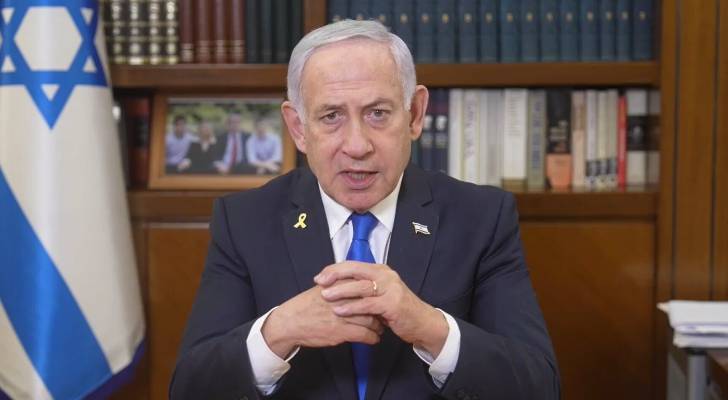'Israeli' Prime Minister Benjamin Netanyahu
The Netanyahu trial: Power, corruption, and the fight to avoid justice
Benjamin Netanyahu, the Israeli Occupation’s longest-serving Prime Minister, is fighting the legal battle of his life. After more than 17 years in power, and nearly three decades as a dominant political force, Netanyahu now stands at the center of a corruption saga that has both gripped and divided 'Israeli' society.
Accused of bribery, fraud, and breach of trust in a trio of cases that span luxury gifts, media manipulation, and corporate favoritism, Netanyahu’s trial is more than a legal proceeding, it is a referendum on power, justice, and democracy in 'Israel'.
- Background -
Netanyahu served three separate terms as Prime Minister: from 1996 to 1999, from 2009 to 2021, and again beginning in 2022. But corruption allegations have trailed him for decades, resurfacing again and again with increasing intensity. Those accusations finally crystallized in 2019 when he became the first sitting 'Israeli' Prime Minister to be indicted.
- The charges: A closer look -
Netanyahu faces criminal charges in three interrelated corruption cases.
Case 1000: The Gifts Affair
Between 2007 and 2016, Netanyahu and his wife, Sara, allegedly accepted nearly USD 300,000 in luxury gifts, including cigars, champagne, and jewelry, from Hollywood producer Arnon Milchan and Australian billionaire James Packer. In return, Netanyahu allegedly used his office to lobby for Milchan's financial and legal interests, including a US visa renewal and tax exemptions.
Case 2000: The Media Deal
Netanyahu is also accused of attempting to strike a deal with media mogul Arnon Mozes, publisher of Yedioth Ahronoth, to receive more favorable coverage in exchange for legislation that would weaken a competing pro-Netanyahu outlet, Israel Hayom.
Case 4000: Regulatory Favors
In the most serious case, Netanyahu is accused of promoting regulatory decisions that benefited Shaul Elovitch, former controlling shareholder of Bezeq, 'Israel's' telecom giant, in exchange for positive coverage on Elovitch’s news site, Walla.
Ghost cases
Two additional investigations, Cases 1270 and 3000, were dropped before trial. The first involved allegations of a bribery offer to a judge in exchange for dropping charges against Netanyahu’s wife. The second focused on a controversial submarine deal with Germany, where Netanyahu’s cousin, who represented the manufacturer, allegedly stood to benefit.
While Netanyahu avoided formal charges in both cases, they further fueled the perception of systemic abuse of power.
- What’s at stake? -
If convicted of bribery, Netanyahu could face up to 10 years in prison, while fraud and breach of trust carry penalties of up to three years. But politically, he remains protected, at least for now. "Israeli" law allows him to remain in office unless convicted and exhausted of appeals.
Analysts say this loophole has turned the Prime Minister's office into a shield, and Netanyahu appears determined to use every ounce of its protection.
- A history of legal escapes -
This is not Netanyahu’s first brush with the law. As early as 1997, he was investigated for trying to appoint a sympathetic attorney general. In 1999, he was suspected of accepting lavish renovations from a government contractor. Both cases were ultimately dropped.
Still, the current charges are the most serious yet, and the most persistent. Since the trial began in 2020, it has moved at a glacial pace, bogged down by delays, political instability, and a global pandemic.
- Delays, distractions, and smokescreens -
Critics accuse Netanyahu of using national crises, including repeated wars in Iran, Gaza, Syria, and Lebanon, to delay court appearances.
His government has also tried to reshape the legal landscape itself. In 2023, Netanyahu’s far-right coalition launched a controversial judicial overhaul that critics saw as a direct attempt to weaken the very courts trying him. The move triggered mass protests and divided 'Israeli' society, though it was shelved following the Oct. 7, 2023, Hamas operation. In one striking instance, he was set to testify in March 2025 but avoided the hearing after ordering a surprise attack on Gaza, effectively postponing the trial again.
- Negotiating justice -
Behind closed doors, Netanyahu has reportedly sought plea deals, including one in which he would plead guilty to lesser charges in Case 1000. But he has refused to accept any verdict that would require his resignation or a ban from politics.
In June 2025, US President Donald Trump weighed in, calling the trial a “witch hunt” and urging for it to be canceled or for Netanyahu to be pardoned, remarks that triggered outrage from 'Israeli' opposition figures who accused Trump of meddling.
- The bigger question -
As Netanyahu’s legal battle drags on, its implications go far beyond one man. His critics say he has turned the justice system into a tool for political survival, delaying, discrediting, and even attempting to dismantle it.
Regardless of the verdict, the damage may already be done. Institutions have been weakened, public trust has eroded, and the precedent has been set: that a sitting Prime Minister can use the machinery of state to fend off justice.




